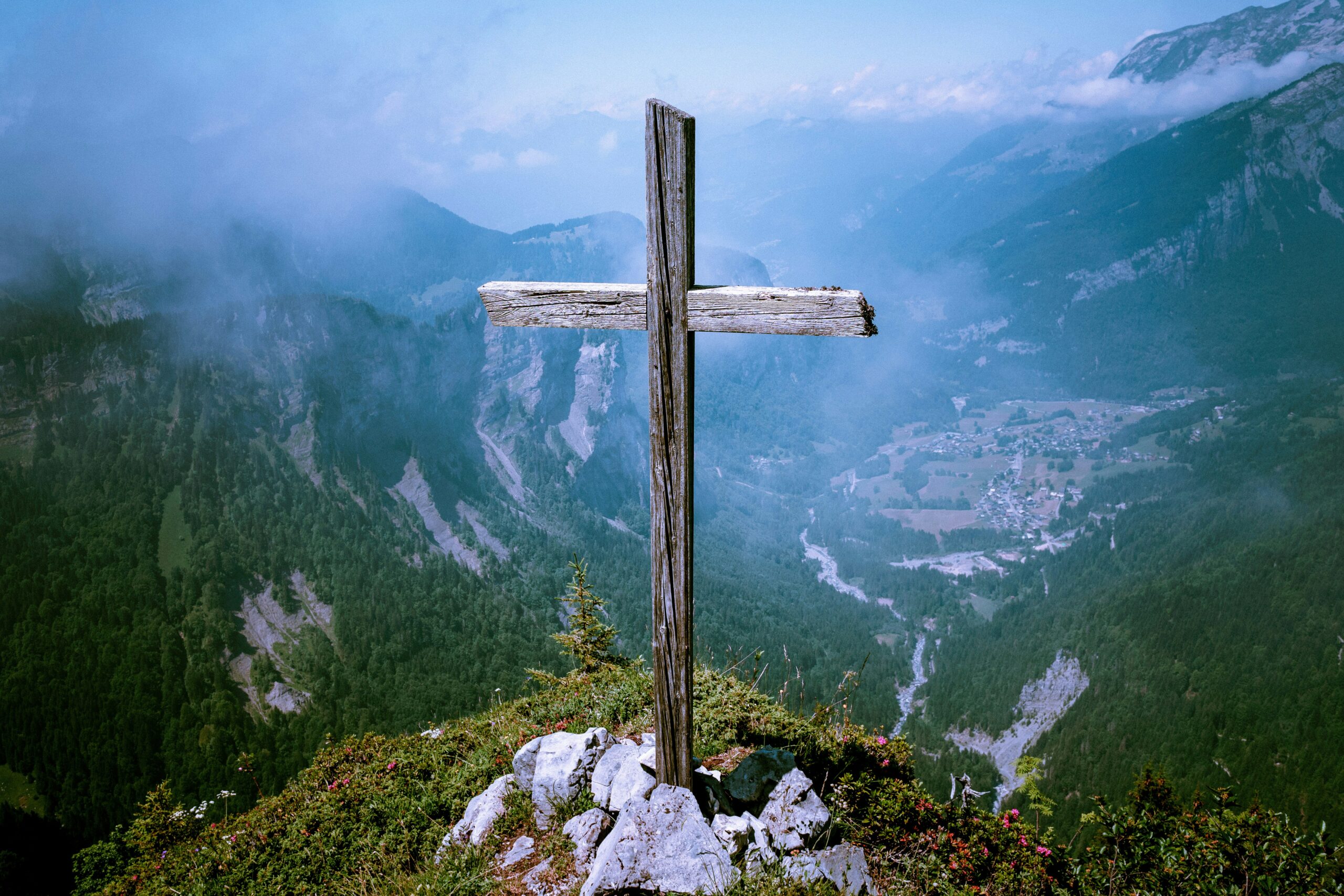The Holy Cross in the Hymnography of the Veneration of the Cross (3rd Sunday of Lent) and Elevation of the Cross (September 14th).
The following in an excerpt from “Eros of Orthodoxy,” translated by Fr. Nicholas Palis and written by Mr. Pantelis Paschou.
On the 3rd Sunday of Lent, the Veneration of the Cross, our Orthodoxy celebrates the veneration of the Precious and Life-giving Cross. And it is very of interesting for all of us to know why the Church in the middle of Holy Lent, lifts up before us the Life-giving Cross. There are three very spiritual patristic interpretations, which answer this perplexity. Let’s look at them.
The first says the following. Because during the forty-day fast, in some manner we are also crucified, we deaden our passions, and receive as we again fall, a feeling of some bitterness. This sometime may even bring us to despondency or melancholy and so the Church in order to support us, puts before us the Life-making Cross, reminding us also in this manner of the Suffering of our Christ on the Cross saying “if our God was crucified for us, how many things shouldn’t we do for him?”
The second interpretation speaks with these words. Just as they who journey on a rough long, difficult road, in the dust and under the burning summer sun, yearn to find a tree to cool down and rest a bit beneath its shade, afterwards to continue the road with their strengths renewed. Thus we also during the time of fasting, exactly in the middle of this road who for many is painful and bitter, the Holy Fathers planted the blessed plant, the wood of the Cross, so that the tired Christians may get a little breath and courage under its life-giving shade, afterwards, rested up and strong, may continue their beautiful journey towards Easter.
The third patristic interpretation that explains to us why the Cross appears in the middle of Lent says the following. In that time, a victor celebrating victories walked through the city, carrying before them their “insignia” i.e. flags, scepters, trophies etc. and afterwards rejoiced alone with the people, who celebrated the victory and were gladdened seeing the royal scepters. Exactly the same thing happens here. The King of the Heavens will shortly defeat death with the cross and will enslave Hades. But before he even reaches the Resurrection, he sends his scepter and trophy, his royal flag, the Life-giving Cross ahead, to give us joy in the fatigue of fasting and our other spiritual struggles and afflictions, to make us ready to receive him, the glorious triumphant of our faith, the great miracle of resurrection.
All these spiritual interpretations are analyzed with much poetical charm and power, in the sacred hymnography of the feast of the elevation of the Cross, or in the Vespers and Matins of the veneration of the Cross. There one can find infinite names which the inspired hymnodists gave to the precious Cross, such as: blessed wood, gate of Paradise, support of the faithful, the wall surrounding the 180 2 Church, invincible weapon, opponent of the demons, prevention of illnesses, glory of the martyrs’, beauty of the righteous, port of salvation, strength of kings, vigor of the righteous, priests’ propriety, rod of power, guide of the blind, doctor of the ill, resurrection of all dead, beauty of the Church, security and guardian of the whole World, angels’ glory, demons’ wound, divine ladder of salvation, life-bearing plant, incorrupt wood, weapon of peace, and invincible trophy.
In the hymns which are read in our church on the feasts of the Cross, every Orthodox Christian who preserves his religious antennas and senses incorrupt and unpolluted, feels a heavenly myrrh come out from the sanctified wood of the Cross and smell sweetly throughout the Church. This divine aroma is impossible for the unbelievers or lukewarm who goes to Church only every Easter. The believer feels it however, lettered or unlettered, he is brought to awesome compunction and alone with the sacred hymnographer chants:
O thrice blessed and all venerable Cross
We faithful venerate and magnify you
rejoicing in your divine elevation.
But as a trophy and irresistible,
guard on all sides, and cover by your grace,
those who cry to you. Rejoice O blessed wood.
A frequent source of the sacred hymnographers is the Old Testament. Today however, the poets of the Church went to a true source of the Old Testament, where God worked a miracle through Moses on her bitter waters. In the 15th chapter of Exodus we read that the people of Israel “came” to Merran where the waters were very bitter and the people couldn’t drink enough to quench their thirst. Then God showed Moses a stick, which as soon as he threw it in the waters of Merra, the waters lost their bitterness and immediately became sweet. This miracle of the Old Testament is a prophecy, a fore imaging of the power of the Cross, which following Christ’s crucifixion on it, altered the bitterness of impiety to a sweetness of piety, and the coldness of disbelief to a warmth of belief. This is what the sacred Theodoretus means, with the words: “for the salutary wood of the Cross, sweetened the bitter see of the Gentiles” as well as Saint Cyril of Alexandria, saying that God is able to make the bitter sweet by word alone, he works the alteration through wood, giving the form of salvation by wood”.
Really, the precious Cross, which is the highest symbol and trophy of Orthodoxy gives spiritual weight and content to our tormented life and shows us the road which leads to Resurrection. If we could discover an easy Christianity with brevity and without a Cross, it would surely be false. Christianity is a “joy/sadness” it is suffering, it is a Cross. “We preach Christ and him Crucified,” says the Apostle Paul. And Christ himself says, “Whoever does not take up his Cross and follow behind me, is not worthy of me”. Each Christian who suffers and toils his personal cross is sweetened looking at Christ’s Cross. In order to have this holy symbol even closer he surrounds himself with crosses: on the domes and church bell towers, on the graves of the dead, on newly built houses whose roofs are still being constructed by carpenters, on flags and banners on the front of houses, on the tall masts of the ships, on the bread which the village women kneed and on the fountains where the villagers and passersby quench their thirst, and on tall trees and crossroads. Upon seeing the Cross, each Christian crosses himself going to or returning from his work in the evening.
A newer saint of the Orthodox church speaking about the precious Cross, says that all of the world is thus called Merra, i.e. bitterness, bitterness, for the many afflictions and misfortunes and grievings, which every day and hour occur to him. So how can the bitterness of the world be altered into sweetness? If you give the Cross of the Lord as an antidote, that is, if you consider this: if a sinless God received so many sufferings for my sins on the cross, and tasted vinegar add the most bitter gall; if he who was Master of all, tried so much bitterness and afflictions, what a great thing it is, if I the servant—and a sinful servant–try afflictions and bitterness not for the sins of others, but for my own? When this thought is deeply marked in your imagination, o Christian, every bitterness and grief which you try in the world can be altered to sweetness and joy,”. And Saint Cyril of Jerusalem also says “My brethren, let us not be ashamed of Christ’s Cross. And if someone is ashamed and hides, you do your cross when you get up, when you walk, when you speak, and always in every moment of your life, do your cross.





